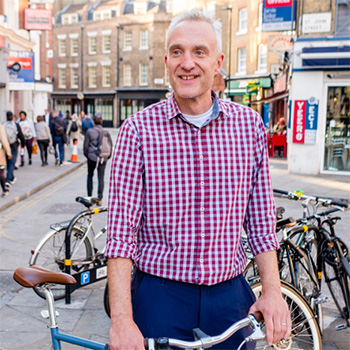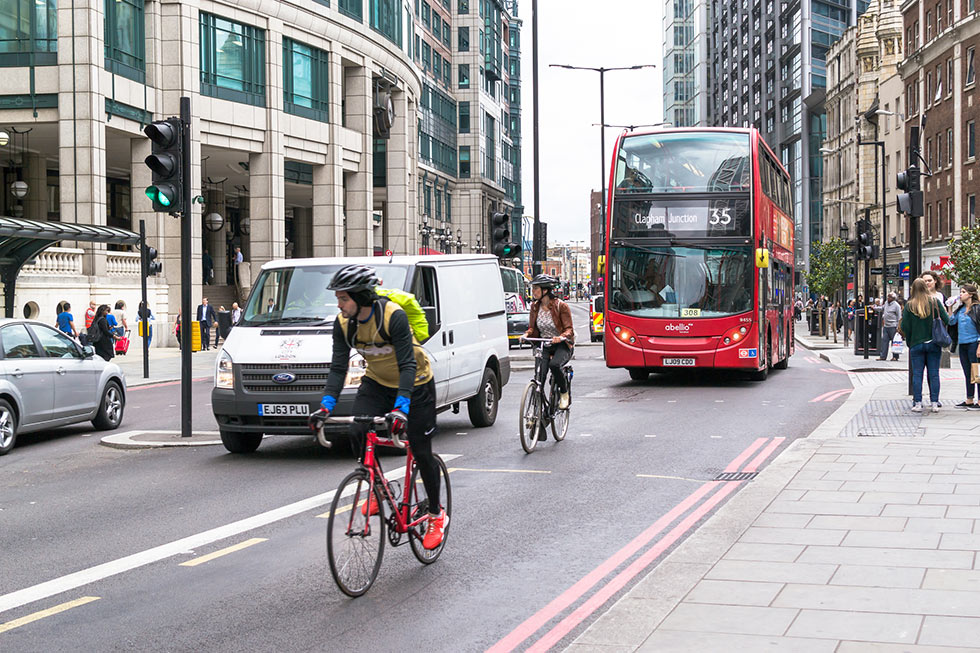
Matt Winfield, Executive Director – England, Northern Ireland and Wales, at walking and cycling charity Sustrans explains the damage recent cuts to active travel funding will have.
Buried in a written statement on 9th March, the Transport Secretary, Mark Harper MP, announced that overall active travel funding for England in the current parliamentary term is being reduced from £3.8 billion to £3 billion.
This includes a two-thirds cut to promised capital investment in infrastructure for walking, wheeling and cycling, from £308 million to only £100 million for the next two years.
But what do these cuts actually mean? And why have over 10,000 people signed our letter calling on the Government to reverse the cuts?
Local authorities have been spurred on by the Government to be more aspirational and build new infrastructure for walking, wheeling and cycling, only to have the ongoing support required ripped out from under them.
In May, the Department for Transport, alongside Active Travel England, announced the winners of previously earmarked funding under ‘Active Travel Fund 4’ (ATF4). Local authorities had the chance to bid for a slice of £200 million, pitting them against each other for who had the most ambitious plans. In the most recent fanfare giving detail to the commitment, the Government failed to mention this funding is about to fall off a cliff.
This is a disaster. As investment crashes to inadequate levels projects will be abandoned, jobs will be lost, and the ability to sustain long-term change to the way people travel is threatened.
These cuts also call into question the Government’s commitment to Net Zero – a target that they themselves are now seemingly backtracking on.

A recent report from Greg Marsden, a former member of the Department for Transport’s Net Zero Board, showed that in the last two years Department for Transport’s actions to reduce transport emissions, including support for walking, wheeling and cycling, have dropped by 72%. The Government argues the responsibility lies with local authorities, but without consistent funding they are being set up to fail.
Active travel isn’t a ‘nice to have’. Active travel and reduced car usage must be at the heart of the UK’s transport decarbonisation plan. Experience elsewhere shows change is possible. Brussels has seen cycling increase by 7% in 5 years, while car journeys fell by over 14%. We just need to give people the opportunity to choose how they travel.
Extrapolating Sustrans’ Walking and Cycling Index 2021 figures to the UK population found that people walking, wheeling and cycling took 14.6 million cars off the road, saving 2.5 million tonnes of greenhouse gas emissions every year.
The Government’s target that 50% of journeys in towns and cities will be walked, wheeled or cycled by 2030 is now impossible. In a letter to the Transport Select Committee, in May, Mark Harper confirmed that he is unable to estimate how much it would cost to reach this goal, but he has no trouble blindly slashing the funding.
Transport for Quality of Life found that even if 100% of new vehicle sales were Ultra Low Emissions Vehicles by 2030, car mileage would still need to be reduced by between 10% and 20% if we are to limit global temperature rises to below 1.5 °C.
This is not about ‘converting’ drivers. It’s about giving everyone the choice to travel however they want – the choice to leave their car at home to walk to the local shop, allow their children to scoot to school along a safe street or feel empowered to commute to work on a bike.
It makes no sense to withdraw investment in active travel at a time of national financial strain, particularly when you consider it contributed £36.5 billion to the UK economy in 2021.
This came from a relatively modest investment from Government when compared to other transport modes.
As it stands, dedicated capital funding for active travel accounts for only 0.08% of the Department for Transport’s 2023/24 overall budget. No other mode of transport would have such short term, vulnerable funding.
The Department for Transport’s own analysis says that active travel schemes provide an average return on investment of £2.40 for every £1 invested. By its own calculations the Government is removing nearly £500 million in economic, social and environmental benefits through these cuts.
With repeated studies showing that walking and cycling improvements increase local retail spend by up to 30%, our high streets and local economies are dependent on people being able to get to them – and wanting to spend time there when they do.
By keeping people active, walking, wheeling and cycling prevented 138,000 serious long-term health conditions and avoided more than 29,000 early deaths in 2021.
Improving such infrastructure is also a means of helping to make our society more inclusive.
Over a third of people on low incomes and a similar proportion of disabled people do not have access to a car. For many that do, it is becoming more expensive to run one. In the next five years, six million British people are preparing to get rid of their cars…we need the infrastructure in place for them to be able to choose to do so.
Following the initial announcement of the cuts in March, Sustrans and other charities called on the Transport Secretary to reinstate the funding, noting that in so many areas “these cuts will leave England lagging far behind other UK nations and London, at a time when we need to be raising the bar everywhere.”
The path to transport decarbonisation isn’t about any one mode of travel, but about fair funding to create an integrated system of sustainable transport including buses, trams, trains, walking, wheeling and cycling, and cars.
We need to think long term, building on the progress we’ve already made, not setting ourselves back and putting ever increasing pressure on future generations to undo this mess. We must give walking, wheeling and cycling the funding it needs, before it’s too late.











